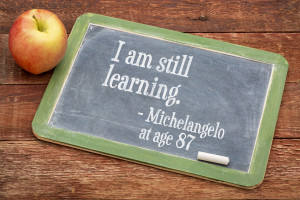 By the time you’ve reached a certain age (okay, let’s say any spot north of forty), you generally feel like you’ve pretty much figured things out. Or if not, you’re perhaps trying to hide that fact from the rest of the world, especially your professional peers.
By the time you’ve reached a certain age (okay, let’s say any spot north of forty), you generally feel like you’ve pretty much figured things out. Or if not, you’re perhaps trying to hide that fact from the rest of the world, especially your professional peers.
The good news: you can stop hiding; we’re all in the same boat!
Getting Your Head around Not Knowing
One of the greatest and most unremitting challenges of the LIS profession is that it’s moving so quickly and in so many directions that it’s really tough to keep your skills current. It’s even tougher to reach a level of competency that won’t become obsolete within the next five years.
From a career standpoint? Pretty daunting. From an ego standpoint? Pretty demoralizing.
Why? Because most of us in the profession are borderline if not certifiable perfectionists – it feels pretty awful to be in “beginner’s mind,” that place of not even knowing what you don’t know. But it’s clear that how good we become at getting comfortable with this discomfort will determine whether we stay professionally viable or become increasingly marginalized.
This reality has been driven home for me as I’ve worked on starting a new project/business. My business plan was exquisitely (I believed) well-thought-through, organized, and formatted (and of course based on all of my research about how to create a killer business plan). Then I started actually doing the work, and was stunned to realize how much I hadn’t, well, realized.
Getting Ego Out of the Equation
You’ve got a number of options when blindsided by the fact that you’re pretty clueless about something you thought you had nailed.
You can decide you’re not cut out for something, and let it go. Plenty of other things to focus on.
You can decide life’s too short and pursuing this dream just isn’t worth the effort it would take to master all the information needed to succeed.
Both of these options let you protect your ego and move on, but they also mean you may never reach for that amazing goal you’d thought about your entire career. So let’s consider option three: is there a way that you can embrace beginner’s mind without losing that sense of confidence that comes with competence?
I think there is: with the life-affirming, energizing, self-compassionate word yet.
Competence as Journey
Writing headlines isn’t something I excel at. I’m not great at writing headlines yet.
I’m not a tech person – I don’t think I can figure out Camtasia. I haven’t mastered Camtasia’s recording capabilities yet.
I’m bummed because I didn’t make as much progress as I’d planned. I haven’t figured out the way to organize my day for peak productivity yet.
There’s hope in the word yet. There’s confidence, and a belief that you can – and are willing to – do the work necessary to achieve your goals.
There’s also recognition that competence in any undertaking is an ongoing journey that will continually have you moving through “crash and learn” phases, as my friend Mary Ellen Bates has dubbed them (and me). But that means you are, in fact, moving, and in the right direction.
If your career dreams are worth your efforts, yet can be your best friend and strongest supporter. Try it out.
